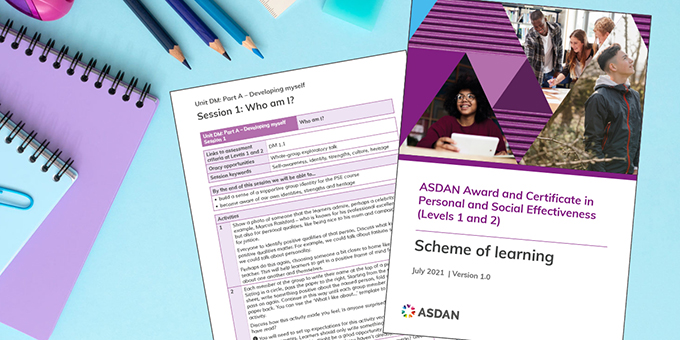 Blog
Blog
30/11/2022
New Scheme of Learning will “equip young people to think for themselves and scaffolds reflection on their learning”
We spoke to Susannah Harlow, a core member of ASDAN’s education design team and one of the co-authors of ASDAN’s innovative new PSE qualifications. We asked her about ASDAN’s approach to designing the Scheme of Learning that accompanies this exciting new skills-based qualification.
ASDAN’s Personal and Social Effectiveness (PSE) qualifications were launched in June 2021, designed to develop skills and competencies in communication, collaboration, research, project management and problem solving, for learners working at Level 1 and Level 2.
The coherent Scheme of Learning that accompanies the PSE qualifications is just one element of the extensive resource package that supports its delivery. The Scheme of Learning is designed to support teachers in planning and sequencing their PSE curriculum so that they can meet a wide range of learner needs. Alongside the Scheme of Learning, the resource pack includes over 30 hours-worth of rich, relevant and relatable teaching resources.

Susannah reflects on the impact of designing the Scheme of Learning with the experiences of the pandemic fresh in her mind. According to Susannah, this put a spotlight on how the PSE qualifications could be designed to help learners with “building resilience…” Susannah says, “for example, a number of lessons were specifically designed to support students to self-regulate when external structures are taken away.”
The ASDAN pedagogy emphasises the need to give learners the opportunity to make connections between what they learn at school and their experiences in the wider world. This is achieved by ASDAN courses integrating explicit opportunities for learners to reflect and engage and think deeply about themselves, how they communicate and how they work and learn from and with others.

Designed to explicitly develop skills of self-awareness
The ASDAN pedagogy supports young people to develop their skills and self-awareness with the intention to help them identify their own thought patterns in the context of the wider world.
In designing the PSE Scheme of Learning, Susannah reflects how, “These are not personality traits that we are born with but teachable and learnable skills. ASDAN’s PSE qualifications are designed to put these skills centre stage.”

A portfolio-based approach
The PSE qualifications are divided into four assessed units.
The successful completion of the first three units:
- Developing myself and my performance
- Working with others
- Problem solving
culminates in the Award in Personal and Social Effectiveness.
By successful completing the fourth unit, learners achieve the Certificate in Personal and Social Effectiveness.
“The fourth unit aims to equip learners with knowledge, understanding and skills in planning, doing and reviewing a project,” says Susannah. “It’s an opportunity to build on the skills developed in the first three units. The important characteristic of the PSE qualifications is that they are portfolio-based and promote learning through doing and reflecting.”
The structure of the PSE qualification reflects its intention to offer both flexibility and learner choice. This structure was co-developed thanks to the close relationship ASDAN has with its members.
Boosting attainment in core subjects
The PSE Scheme of Learning is designed to, “offer activities in which young people will develop their social and emotional skills”, and it, “scaffolds the reflection on their learning”, says Susannah.
“PSE is incredibly flexible and adaptable and can be tailored to a variety of curriculum models in education settings.” An intended benefit of PSE is to, “give learners the personal effectiveness to transfer into their core subject GSCEs” adds Susannah.

Equipping young people with employability skills
Susannah reflects on her experience of being part of the ASDAN PSE design team, “I often return to a comment written by the author Yuval Noah Harari, that what students have to offer to the future economy is themselves. Young people will need to be grounded in their own values and able to relate with others on a local and global scale to adapt creatively and resiliently as change unfolds.” She references another source of evidence that underpinned the design of the PSE qualification,
“…employers most expect the need for other workplace skills unattached to qualifications – such as communication and teamwork – to increase in the next three to five years. But compared with other skills, respondents are the least confident about meeting these skills needs.”
(CBI/ Birkbeck Education and Skills Survey 2021)
Susannah hopes that the PSE Scheme of Learning will, “equip learners to think for themselves. Vocabulary acquisition and literacy is supported, particularly through ‘purposeful’ talk. Each session contains clear objectives and links to the assessment criteria of the qualifications.”
“Some of the books and podcasts that have informed my thinking are referenced in the notes for each session”, says Susannah. “I hope teachers and learners enjoy exploring these ideas as much as I did.”
Find out more about ASDAN’s Personal and Social Effectiveness qualifications.

BIO: Susannah Harlow joined ASDAN as Education Policy and Development Officer in 2019. Prior to this, she taught Religious Studies in a city-based comprehensive school. She holds a Masters in Teaching & Learning and is currently a nursery school governor.